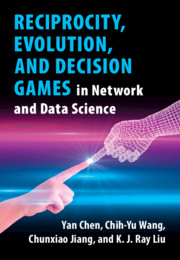Book contents
- Frontmatter
- Contents
- Preface
- 1 Basic Game Theory
- Part I Indirect Reciprocity
- Part II Evolutionary Games
- 6 Evolutionary Game for Cooperative Peer-to-Peer Streaming
- 7 Evolutionary Game for Spectrum Sensing and Access in Cognitive Networks
- 8 Graphical Evolutionary Game for Distributed Adaptive Networks
- 9 Graphical Evolutionary Game for Information Diffusion in Social Networks
- 10 Graphical Evolutionary Game for Information Diffusion in Heterogeneous Social Networks
- Part III Sequential Decision-Making
- Index
7 - Evolutionary Game for Spectrum Sensing and Access in Cognitive Networks
from Part II - Evolutionary Games
Published online by Cambridge University Press: 01 July 2021
- Frontmatter
- Contents
- Preface
- 1 Basic Game Theory
- Part I Indirect Reciprocity
- Part II Evolutionary Games
- 6 Evolutionary Game for Cooperative Peer-to-Peer Streaming
- 7 Evolutionary Game for Spectrum Sensing and Access in Cognitive Networks
- 8 Graphical Evolutionary Game for Distributed Adaptive Networks
- 9 Graphical Evolutionary Game for Information Diffusion in Social Networks
- 10 Graphical Evolutionary Game for Information Diffusion in Heterogeneous Social Networks
- Part III Sequential Decision-Making
- Index
Summary
Many spectrum sensing methods and dynamic access algorithms have been proposed to improve secondary users’ access opportunities. However, few of them have considered integrating the design of spectrum sensing and access algorithms together by taking into account the mutual influence between them. In this chapter, we focus on jointly analyzing the spectrum sensing and access problem. Due to their selfish nature, secondary users tend to act selfishly to access the channel without contributing to spectrum sensing. Moreover, they may employ out-of-equilibrium strategies because of the uncertainty of others’ strategies. To model the complicated interactions among secondary users, the joint spectrum sensing and access problem is formulated as an evolutionary game and the evolutionarily stable strategy (ESS) that no one will deviate from is studied. Furthermore, a distributed learning algorithm for the secondary users to converge to the ESS is introduced. Simulation results shows that the system can quickly converge to the ESS and such an ESS is robust to the sudden unfavorable deviations of the selfish secondary users.
Keywords
Information
- Type
- Chapter
- Information
- Publisher: Cambridge University PressPrint publication year: 2021
